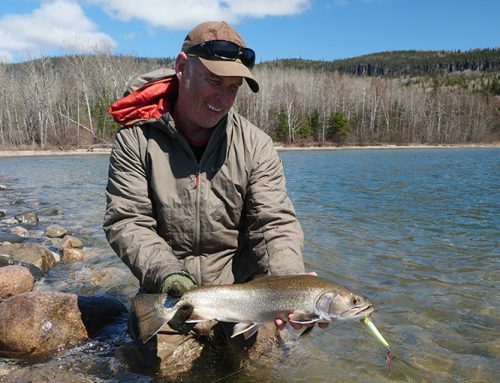
What fish can be taken in unlimited numbers all year long, is particularly accessible in winter, and makes a great main ingredient for traditional fish and chips? If you said the burbot, or freshwater ling, you’re an exception.
One of the most widely distributed cool-water fish in the world, it’s found in all suitable habitats of North American and continental Eurasia. It’s relatively unknown and anglers who do catch one often done appreciate its good qualities. Its ugly looks work against it.
An unpopular catch
Ling resemble a cross between an eel and a cod, and most winter anglers who catch one recoil in disgust and discard the fish. Its lonesome chin whisker, highlighting a wide, raspy mouth, and its slippery, fine-scaled body don’t help matters. But beauty is in the mind of the beholder. I think its sinewy shape and mottled-brown colouring are attractive. Why worry about what they look like? They’re great to eat, and there are plenty of untapped burbot fisheries.
Unless you angle specifically for them, however, chances are you’ll only encounter the occasional burbot while ice fishing for lake trout or whitefish near bottom. In fact, if your favourite winter lake holds these more popular fish, there are probably ling, too.
Winter ling fishing is hardly a high-tech activity, as the pursuit of other fish has often been turned into. The few serious ling anglers I know fish at night, when ling prowl for food, with simple minnow regs set on bottom in the same areas inhabited by lake trout and whitefish. In winter, however, ling can also be found in shallower water. Voracious predators of small fish, ling forage widely after dark. One reason most winter anglers don’t catch more ling is because they only fish during daylight, when lakers and whitefish are most active. But, staying on the ice for just a few more hours in the evening can add some ling to the day’s catch.
Hooking method
Two- to four-inch minnows are ideal hook baits for ling. Live baitfish are best, but, as mentioned, ling have no compunction about dining on dead minnows, salted or frozen. The type of minnow doesn’t matter much either, as long as it’s legal to use in your area. Ling have been known to eat everything from shiners to sticklebacks.
Your favourite trout or walleye balance or flag tipup will work fine for ling. Suitable bottom rigs include bell sinkers with droppers, sliding egg-sinker setups, and whitefish spreaders. Ling top out at about 1o pounds (4.5 kg) in Ontario, with the average less than half of that, so 10-pound-test line and size 4 to 8 hooks will suffice. They also nail jagged spoons once in a while.
On cooking them
Ling are easy to prepare for cooking. I fillet and skin them. The firm, white flesh, cooked with your favourite fish-and-chip-batter, will taste almost like a saltwater cod; after all, they’re related. Un-skinned ling fillets are also great smoked.
For another taste treat, try microwaving. Place serving-sized pieces of burbot in a microwave pan. Brush with melted butter that’s seasoned to taste with black pepper, garlic, and lemon, then cover and cook five to seven minutes, depending on thickness. They’ll firm up to the texture of lobster tail. Dipped in seafood sauce, it’s a close ringer for the real thing.
Little is known about their populations in the majority of our lakes. Your area Ministry of Natural Resources biologist may be able to direct you to the best places to try for them, but count on doing some of your own exploring and experimental fishing. As I mentioned, lakes that hold whitefish and lake trout usually have ling. An evening or two of fishing should reveal if they’re there in numbers.
Even if you don’t purposely go after this homely fish, the next time you ding a ling, take it home for dinner. It will be a welcome guest as the main course.
Originally published in the Winter 1994 issue of Ontario OUT of DOORS
Please check the most recent Ontario hunting and fishing regulations summaries, as rules and regulations can change
For more on ice fishing, click here
Click here for more outdoors news






Leave A Comment